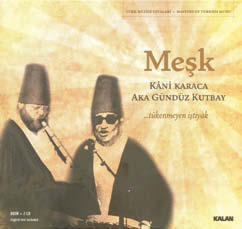Aşk(Love)
Author: Francesco Martinelli
View album and artist detailsAlbum and Artist Details
Meşk
Artist/band: |
Kani Karaca |
Label: |
Kalan 483484 |
Magazine Review Date: |
July/2010 |
Artist/band: |
Aka Gündüz Kutbay |
Label: |
Kalan 481482 |
Magazine Review Date: |
July/2010 |
Don Cherry and Rafael Garrett brought exciting news about this astounding ney soloist, steeped in the mevlevi tradition but fearless in joining jazz improvisers, his apparently primitive instrument powerful and flexible like a saxophone. Okay Temiz then brought us his sound on the seminal 1979 Zikir record, but Aka Gunduz died later that year, on a hot August day.
Apprenticed as a cobbler, he fell in love with the ney, trying to fashion flutes out of cardboard tubes; reputedly it was blowing them that helped him get his famous huge sound, low notes so resonant and buzzing that they seemed to be breaking his instrument, often made himself from a reed of unusually large diameter. His talent, developed with the best Istanbul musicians, won him a radio job, and a key role in the musical accompaniment of mystical mevlevi functions. Aşk is a selection of his best recordings, mostly solo, sometimes with another instrumentalist or two. This is ney playing at its best, with melodies flowing over the seyir (the sequence of notes of the makam), from longingly lyrical to broodingly dramatic in character. A curio is the closing track, a modern duo piece by Mutlu Torun for ney and oud used in the 70s on Turkish state television as interval music.
Meşk refers to the oral transmission of music in the tekke tradition: pupils sing with the master, beating the proper usul (rhythm structure) before trying to play along. But it’s much more than a transmission of techniques. Aka knew the rarest and most ancient makams, but he bought an Akai tape recorder to document meşk sessions: a selection of these forms the core of the second album. Aka’s tone, akin to the throaty recitation of dervishes in ecstasy, is a perfect match for the voice of singer Kani Karaca, the acknowledged master of Turkish Muslim religious singing of the late 20th century. In the opening track, Kutbay and Karaca perform in perfect coordination a serpentine Ottoman composition for half an hour. What follows are relaxed conversations and informal examples of their playing, while the second CD presents the vocal part of an ayin (mevlevi rite) in the ‘Şevk-u Tarab’ makam; without instrumental accompaniment, this seems for study only. Sound quality varies – some items clearly come from vinyl, others from concerts – but it’s acceptable. A judicious selection from these four CDs could give Kalan a stunning introductory disc to these two unique artists.

_f01.jpg)
